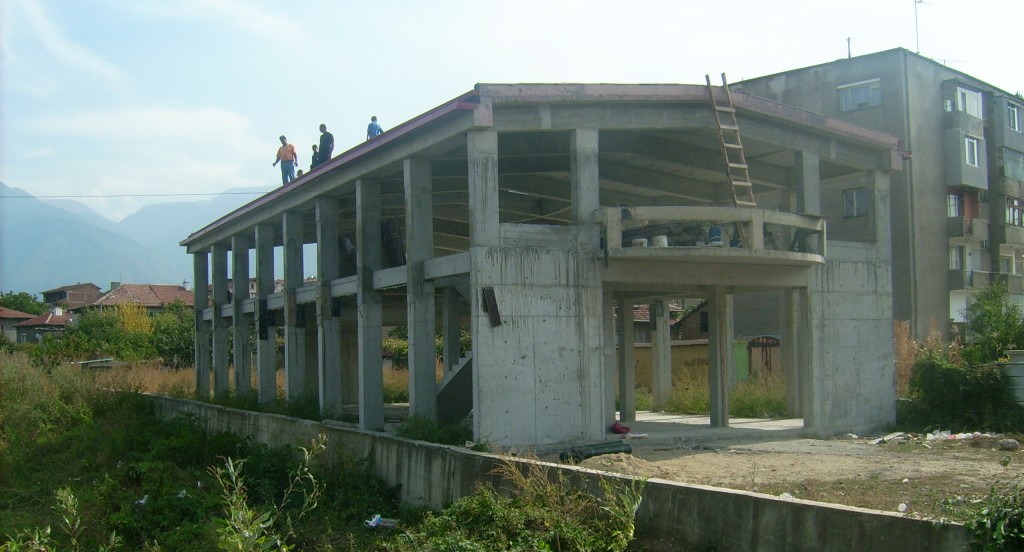Bulgarian Evangelical Church Analysis 2010
1. The growing number of visitors of evangelical churches, caused by the socio-economical factors in 2010, will demand a time sensitive model for church conflict resolution and the restoration of church-wide unity. In this process, the evangelical preaching must adequately include the Bible teachings of forgiveness, agreement and unity.
2. In the context of the socio-economic crises and the inadequacy of traditional religion in 2010, more celebrities and politicians will show interest toward the evangelical churches and the elements of their services. It is a time for evangelical preaching to leave the four walls of the church and to juxtapose the Biblical standard for living as the social bases for building society.
3. The finalization of major church building projects in 2009-2010 will relieve a number of congregations from rent obligations, thus releasing more resources and funds despite the crises. The recipients of this blessing must use their buildings to relieve other evangelical churches from rent obligations in their respective regions, thus overcoming the feeling of power and priority and actualizing the vision of the Kingdom for brotherhood and unity. A church building could be used by 3-5 midsize congregations with a suitable program of services and a common Sunday service. The given blessing will either become a blessing for others or be taken way.
4. The search for responsibility from leadership as a whole is a process, which is constantly present within the evangelical movement with a special focus in the last 20 years. In regard to the said financial freedom in 2010, this search must be brought to an adequately working and properly contextualized model for leadership, which includes not only economical, but spiritual responsibility on the part of church leadership as well. It is impossible to define a life of holiness outside of the context of social relationships.
5. The opening of secret police dossiers belonging to leading religious leaders from the past and the present, purposes the destabilization of a unified and growing evangelical movement. Nevertheless, it is a process which must occur and a road that must be travelled by the Church in order to remove the unnecessary suspicions conceived by temporary external to the church factors. In this process, the guilty ones must humble themselves, while the hurt ones must forgive in order that the unity of the church is restored again.
6. Every persecution is a result of a broken balance in the relationship between church and state. Strong confrontation and persecution toward evangelical churches in 2010 is the natural result from the gradual increasing in restrictions of religious liberty and human rights. But in the struggle the Church does not weaken. On the contrary, the evangelical church knows how to heal in the processes of persecution and therefore they must be viewed as purification of the church for growth.
7. The increase of cases of religious persecution in 2010, in which the state religion aims at alternative faith communities in order to hide its own inadequacy in a given crises moment, may vary from a political position of the Church in society to creating a spiritually healthy new generation. These dynamics are results from the furious misbalance between the social position of the state church and its spiritual bankruptcy.
8. Within the lack of balance in the relationship between church and state, every change in the Religious Law in 2010 will result in a negative connotation toward evangelical churches. The society is unready to accept the protestant faith as a standard, although it applies it subconsciously in all social spheres – from culture to economy. There is no successful capitalist society without protestant values, and this fact must be realized by all church leaders.
9. The increasing return of immigrants back to Bulgaria in 2010, due to the prolonged economical crises in Europe, will create a flow of new thinking, ideas and dynamics in the Church, but it will not decrease the intensity of establishing new Bulgarian immigrant congregations in foreign lands.
10. After 20 years of democratic changes within the society and the church, in 2010 a new generation of leaders reaches adulthood. Teams of various church ministries enter a new level of professionalism. The church itself becomes socially aware rediscovering its own spiritual role and redefining its historical identity in a postmodern and post communist context. All this leads to the increase in the need for systematic studying and responsible practice of the principles of church leadership. In this context, the processes of returning to the first love, spirituality and unity are a must. The recognition of the need for such revitalization can in a moment change the status of the Church in history. The lack of recognition will doom the Church to a historical failure.
Bulgarian Evangelical Church Analysis 2009
1. Crises in the denominations were created by a vast spectrum of factors, from the lack of effective model for training a new generation of leaders to organized state restrictions against the evangelical churches.
2. The year 2009 was a time of confusion in the strategy of evangelical churches, accompanied with devaluation of the vision for evangelization, education and unity.
3. The hesitation within the leading denominations was properly detected by the receptive political and government organizations. Because of this, the attack against the evangelical denominations grew with well balanced and precisely targeted constant speed.
4. Among the reasons to put a halter on evangelical churches was to limit their vision for participation in the 2009 elections with (un)expected results.
5. The number of church visitors grew due to the political insecurity and economic crises. Yet at the same time, there was a decrease in visitors in the contexts of the new wave of immigration. These dynamics created a balance with the sense of plateau.
6. The stagnation within the evangelical movement was compensated with concerts and conferences, but unfortunately the elements of fasting, prayer and giving were rarely present.
7. Almost 15 years after the global introduction of the Internet through Windows 95, evangelical churches have begun to develop a sense for media. Media presence is increasing positively, which is justified with the growing interest in evangelical preaching and the social message which it carries. Unfortunately, in most cases the media presence becomes popularity without justification and an idea lacking strategic planning; thus, it currently does not produce adequate results.
8. The crises for leadership is a growing problem for the evangelical churches, which are currently lead by leaders without successors. The older generation of pastors is without a doubt influenced by the totalitarian model for leadership, while the ones who have been successful in separating themselves from it remain “self-taught leaders.” The newly founded denominations are unable to become the so-needed alternative. Processes of fatherhood and passing on of leadership are lacking, which births a growing interest toward the problems of church leadership.
Haiti disaster relief – your church can help…
On January 12, 2010 Haiti was devastated with a 7.0 earthquake. At least 24 after-shocks occurred. We do not yet have an assessment of damage to our schools, orphanages, and churches. We have had limited contact since the disaster. Our largest church (8,000 members) is located near the Palace, which suffered damage.
In Haiti we have 1,068 churches and missions, and over 250,000 members. We have had ministry in Haiti since 1933. Please pray for our people’s safety and provisions.
Operation Compassion is aiding in the relief efforts, and World Missions will send supplies and personnel as the opportunity avails itself. If you wish to contribute funds, send to Haiti Disaster Relief, Project 765-0042 .
We will update you on this situation as information comes in. Please continue to keep our brothers and sisters in Haiti in your prayers.
Douglas LeRoy, General Director
Church of God World Missions
http://www.cogwm.org/index.php?option=com_content&task=view&id=2661
Revival in the Dupnitsa Church of God
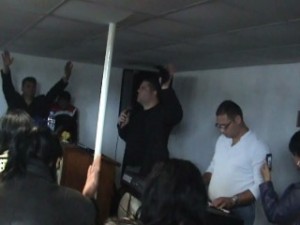 The Dupnitsa Church of God has been on our hearts for almost a year now, before we were able to return and minister there. The congregation is emerging from having undergone several church splits in the years past and is now growing stronger than ever. Ministry teams are being formed along small group studies and village extensions in the region. With no help from anyone and very small income for the area, the people of the church are completing a building project with over 1,000 square feet two story sanctuary, which will incorporate various ministries like computer courses for children, soup kitchen and ministerial training. When we visited with the church last year, they only had the foundations ready, but during this visit their team had been able to finish the roof right before the rainy season in Bulgaria.
The Dupnitsa Church of God has been on our hearts for almost a year now, before we were able to return and minister there. The congregation is emerging from having undergone several church splits in the years past and is now growing stronger than ever. Ministry teams are being formed along small group studies and village extensions in the region. With no help from anyone and very small income for the area, the people of the church are completing a building project with over 1,000 square feet two story sanctuary, which will incorporate various ministries like computer courses for children, soup kitchen and ministerial training. When we visited with the church last year, they only had the foundations ready, but during this visit their team had been able to finish the roof right before the rainy season in Bulgaria.
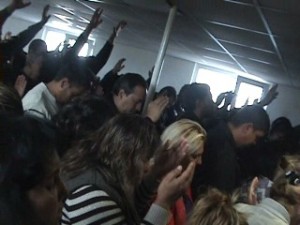 It was only natural that our team had a desire to contribute to such a great project and upon the recommendation of the pastor during October 2-4, 2009 we held a three-day revival with services in the evenings and training workshops during the day. Several of the services had a powerful impact on the congregation as virtually every night we stayed in prayer and fellowship till midnight. At the end of our stay we were asked to return very soon to the Dupnitsa Church of God for two parallel events: a parenting seminar and a Bible Study on the Book of Revelation.
It was only natural that our team had a desire to contribute to such a great project and upon the recommendation of the pastor during October 2-4, 2009 we held a three-day revival with services in the evenings and training workshops during the day. Several of the services had a powerful impact on the congregation as virtually every night we stayed in prayer and fellowship till midnight. At the end of our stay we were asked to return very soon to the Dupnitsa Church of God for two parallel events: a parenting seminar and a Bible Study on the Book of Revelation.
40 False Teachings in the Church of the 21st Century
1. That Christianity is a religion and social status, rather than a personal life of holiness and relationship with God.
2. That Christians need standards and rules other than the Bible in order to live a Christian life.
3. That the divinely inspired text of the Bible needs human additions and alterations.
4. That the practices described by the Bible are not for today, as if the Bible is wrong.
5. That Christianity is religion for the weak.
6. That governments and countries are responsible for the growth and prosperity of the church.
7. That we must accept the world in order that the world accepts us.
8. That Postmodernity is Biblical teaching.
9. That the evolution theory is compatible with the Biblical teaching of the Creation.
10. That God needs our strategies, offices, plans and training based on the principles of the contemporary marketing and management in order to lead His Church like His strength has vanished.
11. That the church is successful only because of our personal participation.
12. That the personal works of righteousness are more important than the works of faith which the Word requires from us.
13. That life without sin is not possible.
14. That man has no free will, but is a subject of predetermined choice.
15. That once saved, a person is always saved regardless of the lifetime between his/her salvation and death.
16. That the Trinity is a composite of three different persons, and is not trinitarian nor monotheistic.
17. That Jesus Christ becomes the Son of God only after the incarnation.
18. That the leadership of the Holy Spirit is not needed in the church any longer.
19. That there is baptism of the Holy Spirit without speaking in other tongues.
20. That the gifts of the Holy Spirit can be practiced without a life of holiness.
21. That there is Biblical preaching without confirmation from the Holy Spirit with gifts and miracles.
22. That only elected men can preach the Gospel, as if the preaching of the Gospel is not an obligation of every believer.
23. That the Revival in the church is for a particular period of time and not a personal responsibility for every believer to live a life of revival.
24. That only because the Church does not operate under the anointing given to it, the gifts of the Holy Spirit have ceased to exist.
25. That only because we do not have personal discipline to pray and fast until God answers our prayers, He cannot do miracles as He has done before.
26. That because some prosperity teachings have over exaggerated some doctrines God does not supply needs any longer.
27. That one can change the spiritual laws and reap without having sowed.
28. That it is more blessed to receive than to give.
29. That to show mercy is an act of weakness.
30. That the minorities in the church, which form its ethnic variety, are its worst part.
31. That you can be a part of the Church without being part of the Spiritual Warfare.
32. That you can be victorious without Christ, without his sacrifice on the cross and without the power of his blood.
33. That when you are personally upset with certain people you have the right to simply leave the church.
34. That not going to church as an act of protest is an acceptable form of Christian behavior.
35. That cell groups without leadership and accountability are the apostolic model for the church.
36. That there are two kinds of Christians – layman and clergy, and that the Church must be without structure and hierarchy.
37. That there is no Rapture of the Church.
38. That the Rapture and the Second Coming are the same event.
39. That the Rapture is not before the Tribulation.
40. That the unrighteous and the ones who evidently live a life of sin will participate in the rapture of the Church and will be resurrected with the righteous dead.
Preaching on II Timothy 1
Mission Bulgaria 2009: Ministering at Samokov Church of God
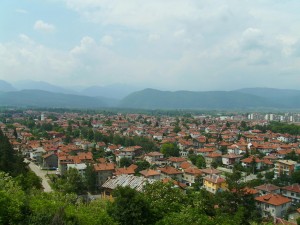
It is always a delight to return to the city of Samokov near Sofia and minister there. Recent developments have dictated that two Church of God congregation in near-by locations minister to over 3,000 Spirit filled members from the gipsy ethnos in the area. The growth is so tremendous, that one of the congregations have baptized in water 207 people last month alone. The other congregation is led by the national overseer of the Bulgarian Church of God, Pastor Alexander Todorov. We ministered in Samokov on the subject: 20 Signs of the Last Days and were also able to schedule other ministry appointments with the churches in the area. The regional leadership seminar was also discussed for a
time convenient for all pastors in the region, as it has been in the plans for sometime now due to our ongoing ministry in other areas of the country. It is our heartily desire that this ministry event combined with the prayers of the saints will result in the union of the Spirit-filled believers in the city of Samokov producing a mighty wave of revival in the lives of the people which will change the spiritual landscape of this area forever.
Church of God Eastern Europe Missions: Leadership, Economics and Culture
By the end of 2003, in a dissertation proposal for the Church of God Theological Seminary, which dealt with Bulgarian American congregation from an evangelical point of view, we suggested that there is not just one single problem that contributes to the struggle of these congregations to establish themselves permanently in the North American culture. The research which followed in the next couple of years, further showed that a multilayered dilemma consisting of economical, cultural and leadership factors was the reason for both the success or failure for the church communities established by Christians emerging from a postcommunist context.
The research results confirmed the originally proposed problem in ministry, not only within Eastern European congregations in North America, but also by partnering ministries, research foundations and practicing colleagues working in the former Soviet satellites. The majority agreed, that not only the existence of the described tridementional dilemma, but the lack of a properly applied solution for it, constrained Christian congregations emerging from this context from reaching their potential in their respective communities. Rather symbolic in this discussion still remains the remark made by one of the leading Bulgarian experts in religious freedom and human rights, who elaborated our statement that Bulgarian evangelical congregations remain “beggars in a land of plenty” not only in America, but in the European Union as well, being held prisoners of their own mentality formed by the communist past.
Our work in the Bulgarian evangelical context, gave us the opportunity to extend this research beyond the North American scope into Bulgarian immigrant communities in Great Britain, Italy, Spain, Germany and Switzerland. The study repeatedly confirmed that these congregations struggled with the same dynamics we had proposed originally, which naturally led to applying the research model in a native Bulgarian context.
Our direct work in the past five years with over 400 hundred Bulgarian congregations from various evangelical denominations has confirmed that the problem of ministry for the majority of Bulgarian protestant churches both in and outside of Bulgaria, emerges from three groups of factors related to (1) leadership, (2) economics and (3) culture. Problems and solutions of this nature or their lack thereof, conforms the work of any missional organization ministering in an Eastern European context. The work of the Church of God European Mission makes no exception to this rule, as the proper timely address of these issues with applicable and unambiguous resolutions defines the very foundation of the state of the Bulgarian evangelical church in the beginning of the 21st century.
National Leadership Seminar for the Bulgarian Church of God Continues
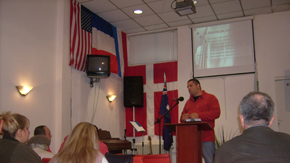 Levels 3-5 of the Leadership Seminar were presented on Saturday afternoon in the Gabrovo Church of God. The following topics were covered: 21 Laws of Leadership from a Biblical Perspective, 52 Leadership Principles of Jesus and 17 Laws of Teamwork for Churches. Plans have been made for the seminar to be held in Bourgas, Sofia, Samokov and Russe.
Levels 3-5 of the Leadership Seminar were presented on Saturday afternoon in the Gabrovo Church of God. The following topics were covered: 21 Laws of Leadership from a Biblical Perspective, 52 Leadership Principles of Jesus and 17 Laws of Teamwork for Churches. Plans have been made for the seminar to be held in Bourgas, Sofia, Samokov and Russe.
On Sunday we delivered a message entitled 10 Signs of the Last Days. This is a sermon accompanied by a powerful media presentation that informs of recent developments in Bible Prophecy and urges believers to prepare and stay ready for the final hour of Biblical eschatology.
After the morning service, we traveled south to meet with pastors in Kazanlak and Stara Zagora and reached the city of Dimitrovgrad located South of the Balkan Range. We were invited to speak to the hundreds of young people from Bulgaria, Ukrain, Russia and Molodva who had gathered there for a youth rally. As planned and expected we announced the release of the newest of our ministry websites – a GodTube like web community called Bibliata.TV.
Leadership Seminar for the Bulgarian Church of God
 A month ago, Cup & Cross Ministries visited the Samokov congregation pastored by Church of God National Overseer Alexander Todorov. Our team then left for the Salvation Church of God in the capital Sofia, to hold the first level of the Church Leadership Seminar. We have worked on this course for the past two years and designed it to serve as a tactical ministry training element in our national strategy for Church of God congregations. The first module included topics such as:
A month ago, Cup & Cross Ministries visited the Samokov congregation pastored by Church of God National Overseer Alexander Todorov. Our team then left for the Salvation Church of God in the capital Sofia, to hold the first level of the Church Leadership Seminar. We have worked on this course for the past two years and designed it to serve as a tactical ministry training element in our national strategy for Church of God congregations. The first module included topics such as:
(1) The leadership principles of Jesus
(2) Recognition, training and personal qualifications of a successful leader
(3) The principles of God’s timing
(4) Sacrifice, responsibility, investment and delegation
(5) The law of sowing and reaping
(6) The law of navigation
(7) Problem solving
(8) Psalm 23 for leaders
Subsequently, we released on the internet a 34-part series called the Successful Leader. Immediately after we held the course in Sofia, we began receiving invitations to hold the course in various locations in Bulgaria. As a result, we scheduled the first level of the leadership course with the churches in Sliven, Bourgas, Rousse and began planning its future presentation with the churches in Gabrovo, Yambol, and Samokov. We will be then returning to Samokov and Sofia in September to teach the second level of the Church Leadership Course in the Church of God congregations there.



